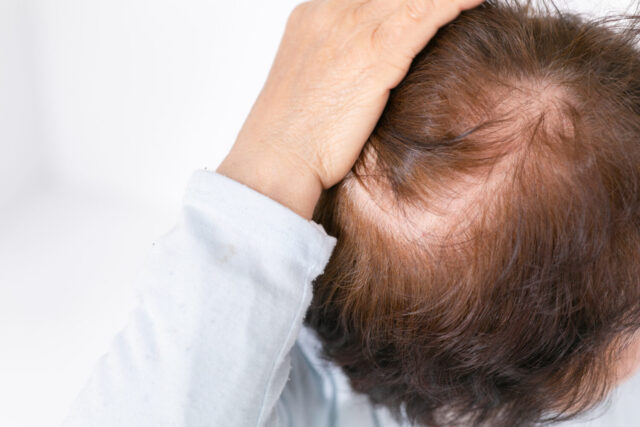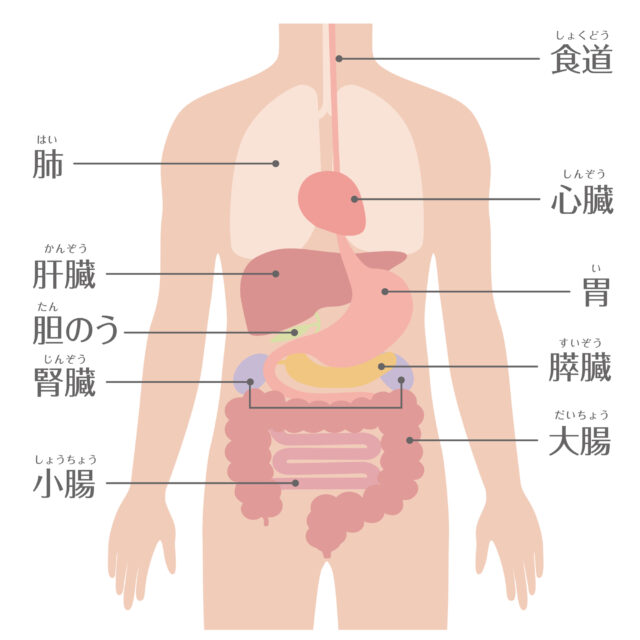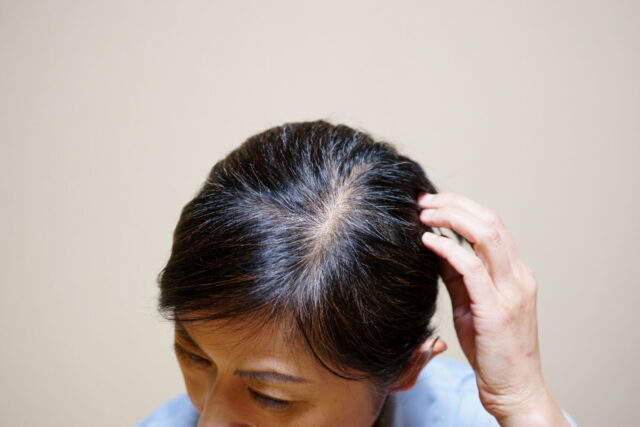
“What is alopecia areata caused by diseases of internal organs?”
“What is the difference between alopecia areata and hair loss caused by diseases of internal organs?”
Many people suffer from alopecia areata, a condition in which hair loss symptoms appear suddenly. The cause of alopecia areata is not only an autoimmune reaction, but may also be related to diseases of internal organs or collagen diseases.
In this article, we will discuss the relationship between internal organ diseases and hair loss, how to distinguish alopecia areata from hair loss due to internal organ diseases, and which hospitals to see. By reading this article, you will have a better understanding of the causes of alopecia areata, how to deal with it, and how to consult an appropriate medical professional. We hope you will find the answers to your questions about alopecia areata and find appropriate measures to deal with it.
この記事で説明する内容は?
- What is alopecia areata caused by internal organ disease?
- Alopecia areata and related Internal organ diseases
- the Difference between Alopecia areata and Hair loss symptoms of internal disease
- Alopecia areata and Collagenous hair loss
- Hospitals where patients with Alopecia areata of visceral origin should be seen
- Conclusion

Kentaro Kato, Hospital director of Osaka AGA Kato Clinic group, specializing in comprehensive hair treatment. We specialize in cutting-edge treatments for a variety of clinically proven effective treatments for thinning hair and hair loss. Graduated from Faculty of Medicine, Kinki University in 2001 Worked at plastic surgery of Osaka Medical and Pharmaceutical University Hospital as an anesthesiologist from 2001 to 2005. Worked as a head of plastic surgery at major cosmetic surgery, Hair Transplant Department from 2005 to 2011. Opened Osaka AGA Kato Clinic in 2011. Japan Society of Plastic and Reconstructive Surgery, Regular Member. The Japanese Society for Regenerative Medicine, Regular Member. World Academy of Anti-Aging & Regenerative Medicine, Regular Member.
What is alopecia areata caused by internal organ disease?

Alopecia areata may be caused by internal diseases or disorders. This is because internal organ diseases can affect the body’s overall metabolism and hormonal balance, which can disrupt the hair growth cycle and result in hair loss. Specifically, abnormal thyroid hormones and increased inflammatory cytokines are thought to be involved.
Normal mechanism of alopecia areata
Alopecia areata is a condition in which a portion of the scalp or body hair falls out in a circular pattern. The cause is believed to be an autoimmune reaction, in which the immune system mistakenly attacks the hair follicle (the area where hair grows), causing the hair to fall out.
Stress and genetic factors are also said to play a role, but the detailed mechanism has yet to be elucidated.

Visceral diseases and disorders associated with alopecia areata include;
- Cirrhosis and hepatitis
- Nephritis and renal failure
- Gastric ulcer and Ulcerative colitis
- Hypothyroidism
- Diabetes
Each of these internal diseases is described below.
Cirrhosis and hepatitis
Cirrhosis and hepatitis cause the liver to function poorly. When the liver does not function properly, nutrient metabolism and hormonal balance can be disrupted, which can lead to alopecia areata.
The liver produces nutrients necessary for scalp health and maintains hormonal balance in the body. Therefore, when the liver functions poorly, it may lack the nutrients necessary for hair production, causing alopecia areata.
In particular, impaired metabolism of ammonia due to liver cirrhosis has been reported to affect hair production. Ammonia is a toxic substance produced in the body, which is converted into harmless urea and eliminated by the liver.
However, as cirrhosis progresses, ammonia metabolism fails and blood ammonia levels rise. This may inhibit hair production.
Nephritis and renal failure
Nephritis and renal failure are diseases that reduce kidney function, and these diseases can affect alopecia areata.
Reduced kidney function can cause a condition called uremia, in which toxins in the body accumulate instead of being excreted. This can result in a lack of nutrients necessary for hair growth and alopecia areata.
Gastric ulcer and Ulcerative colitis
Gastric ulcers and ulcerative colitis can cause inflammation and ulceration of the digestive tract, resulting in decreased absorption of nutrients.
In particular, ulcerative colitis increases the production of substances that cause inflammation (inflammatory cytokines), which may adversely affect hair follicles.
Alopecia areata may occur as a result of nutrient deficiencies and inflammatory cytokines.
Hypothyroidism
Hypothyroidism is also known to be associated with alopecia areata. The thyroid gland is an important endocrine organ that secretes hormones that regulate metabolism and growth.
Graves’ disease is characterized by excessive secretion of thyroid hormones, while Hashimoto’s disease is characterized by low thyroid hormone levels. In both diseases, hormonal imbalances can affect the hair growth cycle and cause alopecia areata.
In hypothyroidism, the secretion of these hormones decreases and the body’s metabolism is reduced. As a result, nutrients necessary for hair growth may be in short supply, resulting in alopecia areata. If hypothyroidism is suspected, diagnosis and appropriate treatment by a specialist is necessary.
Diabetes
Diabetes mellitus is a disease that causes elevated blood glucose levels due to insufficient or resistant insulin action. Prolonged high blood glucose levels in diabetes can cause damage to blood vessels and nerves, resulting in reduced nutrient supply to the hair. This can result in alopecia areata.
the Difference between Alopecia areata and Hair loss symptoms of internal disease

The typical symptom of alopecia areata is the appearance of circular or oval-shaped areas of hair loss. These areas of hair loss are painless and non-itchy, and there is no inflammation or abnormality of the skin.
In addition, hair loss may appear in multiple locations, not just one, and is characterized by large individual differences.
On the other hand, hair loss caused by diseases of internal organs is characterized by the fact that it appears along with systemic symptoms and symptoms of other internal organ diseases.
Unlike alopecia areata, hair loss due to visceral disease often tends to be generalized, with thinning and hair loss extending throughout the body.
As the internal organ disease improves, hair loss usually recovers gradually.
Alopecia areata and Collagenous hair loss
Collagen disease can cause alopecia areata, an inflammation or destruction of the hair follicle caused by an autoimmune reaction.
Collagen disease is a type of autoimmune disease characterized primarily by inflammation and destruction of collagen fibers (fibers that make up connective tissue). Typical collagen diseases include systemic lupus erythematosus (SLE), systemic sclerosis(SSc), and sjogren syndrome(SS).
Systemic lupus erythematosus, in particular, is known to cause hair loss as a cutaneous manifestation. However, hair loss due to collagen disease occurs by a different mechanism than alopecia areata, and may be a different condition even if the symptoms are similar. Since collagen disease can cause alopecia areata, it is important to consult a doctor if you are experiencing symptoms of hair loss.
Hospitals where patients with Alopecia areata of visceral origin should be seen

To receive treatment for alopecia areata, it is common to visit a dermatologist or a clinic specializing in hair loss. However, if alopecia areata is caused by an internal disease, it is appropriate to visit a medical department appropriate for your symptoms, such as internal medicine, gastroenterology, nephrology, or thyroid endocrinology.
First, consult your doctor and ask for a referral to the appropriate department.
Conclusion
In this article, we have discussed in detail the causes of alopecia areata, not only autoimmune reactions, but also its relationship to internal organ diseases and collagen diseases. It also explained the effects of related internal organ diseases and collagen diseases, as well as the difference between alopecia areata and hair loss caused by internal organ diseases. In addition, information on hospitals and departments to consult is also provided.
If you are suffering from alopecia areata, it is important to undergo an examination at an appropriate medical institution, taking into consideration the possibility that it is caused by a disease of internal organs or collagen disease. After reading the article, we recommend that you visit a hospital specializing in hair loss that matches your condition to determine the cause of your alopecia areata.
Finding the appropriate treatment will help you cope with alopecia areata more smoothly. To regain healthy hair, consult a doctor first.





